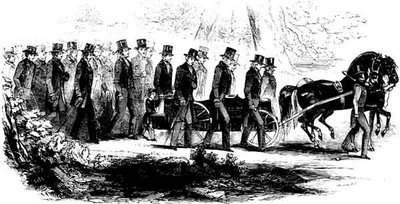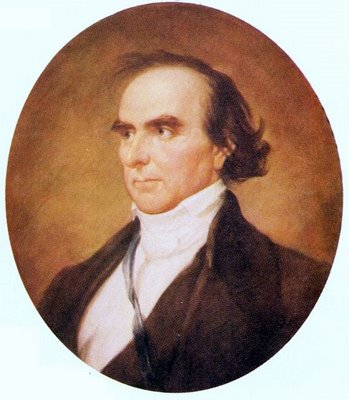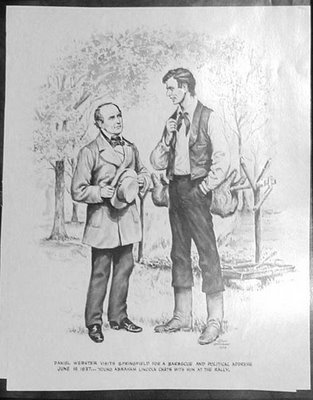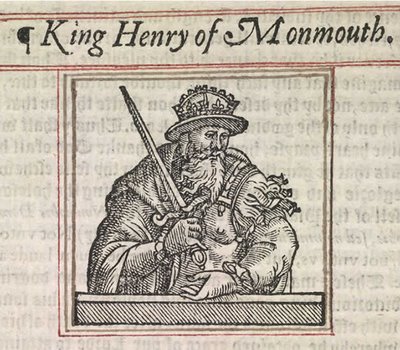Daniel Webster: Great American Orator on Poetry

Daniel Webster was born in Salisbury or Franklin, New Hampshire in 1782, and died in Marshfield Massachusetts in 1852. He was a constitutional attorney, a US Senator, and a great orator. He opposed war, and sought compromise. Some say it is because of his compromising that he did not attain the presidency. It would have been remarkable for this man to have stood his ground firmly as an abolitionist opposed to slavery, and not compromise this position, for instance. A century after his death, in 1957, the Senate voted him as one of the top 5 Senators in US history. We may also vote him in some top 10 or 5 group of all-time US orators, somewhere in the close numbers that lead up to Martin Luther King through John F. Kennedy.

So what does Daniel Webster have to do with poetry? In the course of a life of speeches filled with stirring remarks and quotable quotes, come some thoughts on poetry, worth pondering 170 or so years later. Below are four excerpts from The Great Speeches and Orations of Daniel Webster.

Poetry is found to have few stronger conceptions, by which it would affect or overwhelm the mind, than those in which it presents the moving and speaking image of the departed dead to the senses of the living. This belongs to poetry, only because it is congenial to our nature. Poetry is, in this respect, but the handmaid of true philosophy and morality; it deals with us as human beings, naturally reverencing those whose visible connection with this state of existence is severed, and who may yet exercise we know not what sympathy with ourselves; and when it carries us forward, also, and shows us the long continued result of all the good we do, in the prosperity of those who follow us, till it bears us from ourselves, and absorbs us in an intense interest for what shall happen to the generations after us, it speaks only in the language of our nature, and affects us with sentiments which belong to us as human beings.
at Plymouth Rock, Dec 22, 1820
An aged man, without an enemy in the world, in his own house, and in his own bed, is made the victim of a butcherly murder, for mere pay. Truly, here is a new lesson for painters and poets. Whoever shall hereafter draw the portrait of murder, if he will show it as it has been exhibited, where such example was last to have been looked for, in the very bosom of our New England society, let him not give it the grim visage of Moloch, the brow knitted by revenge, the face black with settled hate, and the bloodshot eye emitting livid fires of malice. Let him draw, rather, a decorous, smooth-faced, bloodless demon; a picture in repose, rather than in action; not so much an example of human nature in its depravity, and in its paroxysms of crime, as an infernal being, a fiend, in the ordinary display and development of his character.
at the trial of John Francis Knapp, Essex County MA, April 6, 1830

A true lover of the virtue of patriotism delights to contemplate its purest models; and that love of country may be well suspected which affects to soar so high into the regions of sentiment as to be lost and absorbed in the abstract feeling, and becomes too elevated or too refined to glow with fervor in the commendation or the love of individual benefactors. All this is unnatural. It is as if one should be so enthusiastic a lover of poetry, as to care nothing for Homer or Milton; so passionately attached to eloquence as to be indifferent to Tully and Chatham; or such a devotee to the arts, in such an ecstasy with the elements of beauty, proportion, and expression, as to regard the masterpieces of Raphael and Michael Angelo with coldness or contempt. We may be assured, Gentlemen, that he who really loves the thing itself, loves its finest exhibitions.
at a centennial birthday celebration for George Washington, Washington DC, Feb 22, 1832
In the early part of the second century of our history, Bishop Berkeley, who, it will be remembered, had resided for some time in Newport, in Rhode Island, wrote his well-known "Verses on the Prospect of Planting Arts and Learning in America." The last stanza of this little poem seems to have been produced by a high poetical inspiration:--
"Westward the course of empire takes its way;
The four first acts already past,
A fifth shall close the drama with the day:
Time's noblest offspring is the last."
This extraordinary prophecy may be considered only as the result of long foresight and uncommon sagacity; of a foresight and sagacity stimulated, nevertheless, by excited feeling and high enthusiasm. So clear a vision of what America would become was not founded on square miles, or on existing numbers, or on any common laws of statistics. It was an intuitive glance into futurity; it was a grand conception, strong, ardent, glowing, embracing all time since the creation of the world, and all regions of which that world is composed, and judging of the future by just analogy with the past. And the inimitable imagery and beauty with which the thought is expressed, joined to the conception itself, render it one of the most striking passages in our language.
"A muse of fire, . . .
A kingdom for a stage, princes to act,
And monarchs to behold the swelling scene!"
The Muse inspiring our fathers was the Genius of Liberty, all on fire with a sense of oppression, and a resolution to throw it off; the whole world was the stage, and higher characters than princes trod it; and, instead of monarchs, countries and nations and the age beheld the swelling scene. How well the characters were cast, and how well each acted his part, and what emotions the whole performance excited, let history, now and hereafter, tell.
at the laying of the cornerstone of the addition to the Capitol, July 4, 1851


by George Berkeley (1685-1753)
On the Prospect of Planting Arts
and Learning in America
The Muse, disgusted at an age and clime
Barren of every glorious theme,
In distant lands now waits a better time,
Producing subjects worthy fame:
In happy climes, where from the genial sun
And virgin earth such scenes ensue,
The force of art by nature seems outdone,
And fancied beauties by the true;
In happy climes, the seat of innocence,
Where nature guides and virtue rules,
Where men shall not impose for truth and sense
The pedantry of courts and schools:
There shall be sung another golden age,
The rise of empire and of arts,
The good and great inspiring epic rage,
The wisest heads and noblest hearts.
Not such as Europe breeds in her decay;
Such as she bred when fresh and young,
When heavenly flame did animate her clay,
By future poets shall be sung.
Westward the course of empire takes its way;
The four first Acts already past,
A fifth shall close the Drama with the day;
Time's noblest offspring is the last.

by William Shakespeare
The Life of King Henry the Fifth:
Prologue
[Enter Chorus.]
Chorus.
O for a Muse of fire, that would ascend
The brightest heaven of invention,
A kingdom for a stage, princes to act,
And monarchs to behold the swelling scene!
Then should the warlike Harry, like himself,
Assume the port of Mars; and at his heels,
Leash'd in like hounds, should famine, sword, and fire
Crouch for employment. But pardon, gentles all,
The flat unraised spirits that hath dar'd
On this unworthy scaffold to bring forth
So great an object. Can this cockpit hold
The vasty fields of France? Or may we cram
Within this wooden O the very casques
That did affright the air at Agincourt?
O, pardon! since a crooked figure may
Attest in little place a million;
And let us, ciphers to this great accompt,
On your imaginary forces work.
Suppose within the girdle of these walls
Are now confin'd two mighty monarchies,
Whose high upreared and abutting fronts
The perilous narrow ocean parts asunder;
Piece out our imperfections with your thoughts:
Into a thousand parts divide one man,
And make imaginary puissance;
Think, when we talk of horses, that you see them
Printing their proud hoofs i' the receiving earth.
For 'tis your thoughts that now must deck our kings,
Carry them here and there, jumping o'er times,
Turning the accomplishment of many years
Into an hour-glass: for the which supply,
Admit me Chorus to this history;
Who, prologue-like, your humble patience pray,
Gently to hear, kindly to judge, our play.
[Exit.]


1 Comments:
This was a very informative post. I've always known Webster as the dictionary I keep by my side, and nothing more. I liked the quotes you referenced from Webster and I liked his stance against slavery.
"The Muse, disgusted at an age and clime
Barren of every glorious theme,"
This is a good poem by Berkeley and I think it is relevant to our world today where much cruelty, emptiness and pain is the theme in many places. That is one of the reasons why I turn to poetry, as a means of escape.
Post a Comment
<< Home